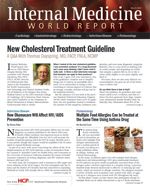Regular Fish Consumption Improves Metabolic Syndrome Components
Regular consumption of white fish may reduce the cholesterol concentration, waist circumference, and blood pressure components of metabolic syndrome.

Several studies suggest diets rich in omega-3 fish oil or healthy monounsaturated fats may be beneficial for people with metabolic syndrome (MetS). Nevertheless, debate on the topic continues as proponents indicate fish consumption reduces cardiovascular (CV) risk, while opponents worry about heavy metal contamination associated with oily fish.
To establish a reliable dietary recommendation, a team of researchers from Spain recently evaluated the effect of regular ingestion of white fish on CV risk factors in patients with MetS.
Using a multicenter randomized crossover design, the authors enrolled 273 MetS patients who added 100 g of Namibian hake to their daily diet for 8 weeks while they received counseling on nutrition. After the subjects crossed over to the control period, they consumed no fish or seafood, but they did receive identical counseling. Throughout the study, the researchers tracked the participants’ lipid profiles, individual MetS components, serum insulin concentrations, insulin resistance, and serum C-reactive protein (CRP) and fatty acid levels.
Though the mean omega-3 fatty acid intake was lower than the daily 2-4 g previously reported as necessary to lower triglycerides, the authors found participants in the fish group had significantly lower waist circumferences and diastolic blood pressures, as well as significantly lower serum low-density lipoprotein (LDL) cholesterol concentrations compared to the levels recorded during the control periods.
While the researchers did not detect any significant effects on serum high-density lipoprotein (HDL) cholesterol or triglyceride concentrations, a significant rise in serum omega-3 fatty acids was observed following white fish consumption. Overall, adherence to the intervention was good and the participants reported no adverse events.
Current CV guidelines encourage the consumption of fish — preferably oily types — at least twice a week. For patients who have MetS, regular consumption of white fish may reduce the LDL cholesterol concentration, waist circumference, and blood pressure components of the condition.
